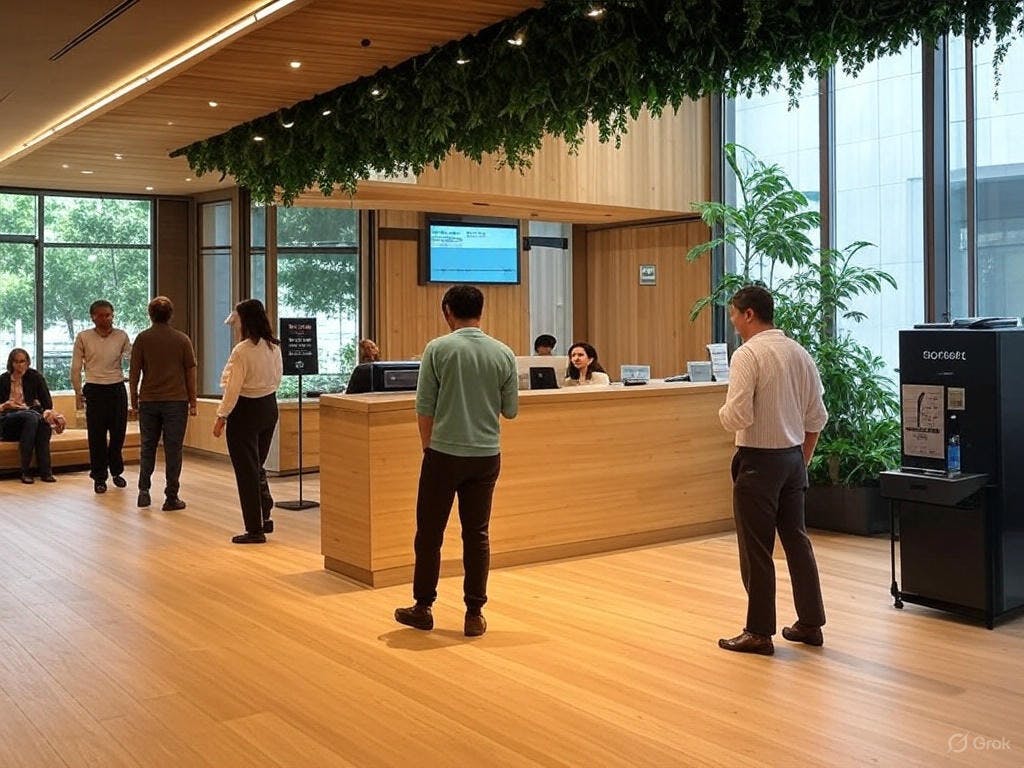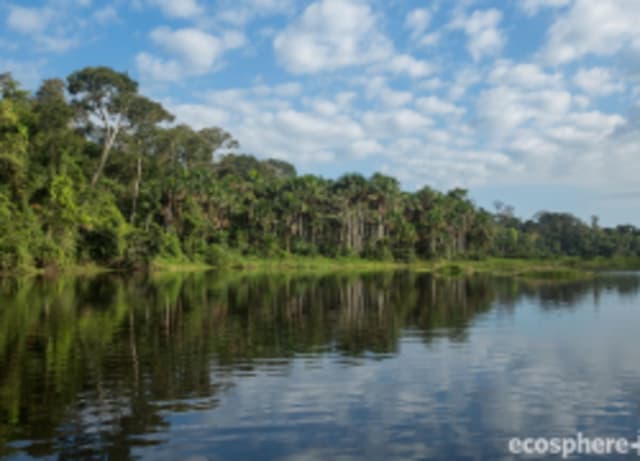Sign up. Be inspired. Get clicking.
Analysing certified holiday booking platforms
3 April 2025
Travel habits have evolved in recent years, with more people prioritising sustainability when planning their trips. A 2023 Booking.com report found that 76% of global travellers prefer accommodation options that minimise their environmental impact.
The pandemic prompted many to reconsider their travel choices, leading to a growing demand for responsible tourism. However, mainstream booking platforms often lack effective filters for identifying accommodation with sustainable practices.
In response, specialised services now bridge this gap by offering verified listings that meet clear sustainability criteria. These platforms empower travellers to make well-informed decisions while supporting businesses that operate with greater social and environmental awareness.
Recent data highlights this shift in consumer behaviour, showing that accommodation with recognised sustainability credentials tends to attract more bookings. Increasingly, travellers are seeking options that align with their values, reinforcing the importance of responsible travel choices.

Why sustainable travel matters now more than ever
The environmental impact of tourism can no longer be overlooked. The industry accounts for approximately 8% of global carbon emissions—comparable to those of entire nations. As air travel, accommodation, and attractions place increasing pressure on natural resources, the consequences become ever more apparent.
Overtourism has intensified these challenges, leading to irreversible damage in popular destinations:
- Venice has introduced daily visitor limits to ease pressure on its sinking foundations.
- Hawaiian reefs continue to deteriorate due to pollution from sunscreen and excessive visitor numbers.
Travellers are becoming more conscious of these issues, with a 2023 survey revealing that 64% prefer accommodation with verified sustainability initiatives. This shift reflects a broader recognition of tourism’s long-term effects.
Wildlife is also at risk when welfare is disregarded. In Costa Rica, sloths used for tourist interactions experience high levels of stress, significantly reducing their lifespan. Such practices undermine efforts to promote responsible tourism.
The United Nations World Tourism Organization (UNWTO) advocates urgent action. Its 2030 agenda calls for tourism that safeguards ecosystems while contributing to local economies. The choices made today will determine the state of our natural and cultural heritage for future generations.

The benefits of using certified holiday booking platforms
Verified sustainable accommodations offer tangible benefits. Specialist platforms such as Staze take steps to address carbon emissions, offsetting twice the amount produced per stay. Compared to conventional bookings, this approach reduces emissions by an estimated 6kg of CO₂ per night.
These services uphold rigorous certification standards. EcoHotels requires properties to meet GSTC-recognised criteria, ensuring alignment with global sustainability benchmarks. Meanwhile, BookDifferent’s StayGreenCheck assesses accommodations based on four key sustainability pillars, promoting transparency.
Some platforms also channel revenue towards local communities. Rooms for Change funds travel scholarships through booking commissions, while Grassroots Volunteering connects travellers with social enterprises that strengthen regional economies.
Beyond carbon reduction, various initiatives help minimise tourism’s broader environmental impact. For instance, Ecosia’s search engine, integrated with bookings, has contributed to the planting of 157 million trees, restoring habitats and supporting biodiversity.
Key impacts of certified accommodations include:
- Wildlife protection: Properties prohibit exploitative activities that harm local species.
- Economic inclusion: 62% of travellers are willing to pay more for stays that directly benefit local communities.
- Resource efficiency: Certified lodgings achieve average energy and water savings of 30%.
How to identify genuinely sustainable accommodations
Verifying truly sustainable accommodations is essential to avoid misleading claims. Look for independent certifications such as GSTC or Green Key, which conduct rigorous audits. Properties that make unverified claims often lack concrete sustainability measures.
Key indicators of genuine sustainability:
- Renewable energy – Solar panels or wind power in use.
- Waste management – Recycling programmes and composting systems in place.
- Water conservation – Low-flow fixtures, such as those at Ecobnb, saving 302 litres per night.
Comparison tools make it easier to assess sustainability. Bookitgreen, for example, uses a 1-5 leaf rating, evaluating 15 key criteria, including energy use and staff training.
Hiring local staff is another strong indicator. Properties where at least 80% of employees come from the local area contribute directly to the regional economy. Guest reviews can also highlight gaps between marketing claims and actual practices.
Transparency is key. Certifications like Travelife provide scorecards with verified environmental and social impact data. Avoid accommodations that use vague terms without proof of sustainability standards.


Top certified holiday booking platforms for sustainable travel
Leading travel services are increasingly prioritising verified sustainability, providing travellers with clear and measurable data on their impact. These platforms emphasise transparency and accountability, from emissions tracking to community-driven initiatives.
- Staze offers real-time carbon tracking, offsetting twice the emissions of each stay through projects such as reforestation. Guests receive precise CO₂ savings per booking.
- Book different integrates 30+ independent sustainability certifications, evaluating hotels based on labour practices, energy efficiency, and wildlife conservation. This allows travellers to make informed comparisons.
- Kind traveler provides exclusive hotel discounts when users contribute £10 to accredited charitable programmes, with over 140 participating hotels worldwide.
- Ecohotels lists 20,000+ GSTC-certified accommodations, the largest selection of independently audited sustainable stays.
- Regenerative travel curates luxury resorts focused on ecosystem restoration, including coral reef conservation lodges.
- Intrepid travel, a B Corp-certified operator since 2018, designs low-emission trips, while Natural Habitat Adventures has been fully carbon-neutral for years, offsetting 580+ tonnes annually.
These platforms demonstrate that sustainability and convenience can coexist. Their growing popularity reflects the increasing demand for responsible travel choices.
Specialised platforms for unique sustainable experiences
Innovative travel models now prioritise both sustainability and local engagement. These services go beyond conventional accommodation to foster meaningful connections between travellers and destinations.
- Fairbnb redefines short-term rentals with a cooperative approach. Unlike mainstream platforms, it allocates 50% of booking fees to community projects, directly benefiting local initiatives.
- Byway travel, a B Corp-certified company since 2022, specialises in flight-free European itineraries. Its rail-based routes promote slow travel and help distribute tourism more evenly across lesser-known destinations.
- Earth changers selects properties through a strict, manifesto-driven process. Each must demonstrate regenerative tourism practices, spanning seven key areas, including wildlife conservation and cultural heritage preservation.
- ROW adventures designs human-powered journeys, such as kayaking, hiking, and cycling trips, to reduce environmental impact. Guides are trained in Leave No Trace principles, ensuring a minimal footprint.
- Gondwana tours maintains a fully carbon-neutral status across its operations. Its small-group trips focus on conservation efforts in locations such as Costa Rica and Rwanda, working alongside local organisations to amplify positive outcomes.
These forward-thinking travel models demonstrate that sustainability and immersive experiences can go hand in hand, offering travellers a responsible and enriching way to explore the world.


How these platforms are making a difference
Sustainable travel services are delivering tangible environmental and social benefits, with efforts spanning reforestation, community initiatives, and policy developments. Data indicates that these actions create a lasting global impact.
Reforestation projects play a key role. EcoHotels plants one tree per booking, while Ecosia’s search engine has contributed to the planting of 157 million trees, helping to restore habitats and combat deforestation.
Social initiatives are equally significant. The Intrepid Foundation has contributed over $4.5 million to grassroots projects, while Responsible Travel’s programmes have provided more than 4,000 children with access to education and healthcare.
Industry standards are also evolving. Booking.com now allows users to filter properties based on sustainability criteria, while GSTC certifications have increased by 140% since 2019, ensuring stricter verification processes for responsible tourism.
Local initiatives continue to address global challenges. EcoHotels' waste exchange programme in Bali is helping to reduce plastic pollution, while carbon-conscious tours, such as those operated by Natural Habitat Adventures, have offset over 580 tonnes of emissions annually.
Key outcomes include:
- Wildlife protection: Certified lodges prohibit activities that harm endangered species.
- Community engagement: 62% of travellers opt for accommodations that prioritise local employment.
- Resource efficiency: Certified properties achieve an average of 30% savings in energy consumption.
This shift in travel priorities highlights the growing demand for services that support both local communities and long-term environmental conservation.
Overcoming challenges in sustainable travel booking
Concerns over trust continue to challenge the sustainable travel sector. A 2023 Booking.com report found that 39% of travellers question the credibility of sustainability labels, largely due to inconsistencies in certification practices across providers.
Misleading marketing remains a significant issue. Many properties use broad terms such as "sustainable" without independent verification. Ecobnb addresses this by enforcing a 15-point evaluation system, assessing factors from energy efficiency to staff training.
Certification costs also present obstacles. Fees associated with GSTC accreditation can strain the budgets of smaller hotels, limiting their ability to obtain recognised credentials. Kind Traveller offers an alternative approach, allowing guests to contribute £10 towards local initiatives in exchange for exclusive discounts.
Key challenges include:
- Cost concerns: 45% of travellers prioritise affordability over sustainability.
- Lack of awareness: 31% are unsure where to find verified accommodation.
- Policy gaps: 34% believe sustainability efforts are ineffective if local regulations do not support them.
A more standardised approach could help resolve these issues. Nearly 67% of travellers support the introduction of uniform labelling across all booking platforms, making it easier to identify credible sustainability efforts.
Technology is also improving transparency. Clearer search filters and impact measurement tools allow travellers to compare options more effectively. Operators implementing these features report a 22% increase in bookings for verified sustainable stays.

Your next steps towards responsible travel
Making responsible travel choices starts with small, informed decisions. Use resources such as the GSTC database to verify accommodations that meet recognised sustainability standards.
Reduce your environmental impact by using Ecosia for trip research—each search helps fund reforestation efforts. Platforms like Kind Traveller allow travellers to support local initiatives through their bookings.
Opt for slower travel methods, such as Byway’s rail-based itineraries, which lower emissions while offering a deeper connection to local cultures.
Raising awareness also plays a role. Sharing details of verified sustainable stays on social media can inspire others and encourage wider industry adoption. Over time, these individual choices contribute to meaningful change in the travel sector.
17 South Street
Auckland 1010
New Zealand
info@carbonclick.com- -
- X
Subscribe now to stay up to date with CarbonClick, carbon offsetting and climate action.
By signing up you agree to our Privacy Policy.


